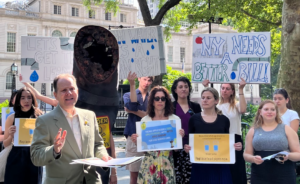NEW YORK, NY — The New York City Council has proposed a controversial new bill — nicknamed the “Rotten Apple Bill” — that would require property owners to take on the task and expense of replacing all of their building’s lead water service lines within the next ten years, costing them thousands of dollars out-of-pocket. Prior to the New York City Council Committee on Environmental Protection, Resiliency and Waterfronts hearing on June 18, the New York City Coalition to End Lead Poisoning (NYCCELP) — a group in support of responsible lead service line replacement — h eld a press conference to oppose the bill.
eld a press conference to oppose the bill.
NYCCELP outlines these major deficiencies of the “Rotten Apple Bill”:
- The bill treats the lead public health crisis as a private issue. The bill shifts financial responsibility from the City to the property owner.
- The bill does not guarantee assistance to financially strapped property owners who cannot afford to replace their lead pipe, but rather takes a wait-and-see approach.
- The bill does not take into consideration effects on renters, especially low-income renters, who will be adversely affected if their landlord raises rents to pay for replacing the lead service line. If landlords decide not to replace the line, tenants could be exposed to lead.
- The bill forgoes the replacement of several hundred thousand lead pipes efficiently and less costly by the City bidding out the work for coordinated replacement of all lead service lines. Instead, each property owner will need to separately schedule, pay for, and secure permits for their own pipe replacement, including street paving, from different companies at different times.
- The bill will create a logistical nightmare that will likely create traffic delays and street closures due to a patchwork of uncoordinated construction projects. Because each homeowner would be scheduling their own pipe replacement, the construction work would thus happen in a hopscotch manner, bringing about massive and unnecessary disruption.
- The bill does not take into consideration health protections, quality control, or consumer protections because various unvetted construction crews would be doing the work.
According to a 2023 report from NYCCELP, there is federal, state, and local funding and financing available to the City of New York for the replacement of lead service lines. These sources include grants, low interest or no interest loans, bonding, and water rates. Research shows that when the cost of replacement is transferred to private owners the results are highly inequitable, with low-income and communities of color bearing disproportionate impacts. NYCCELP believes that New York City should assume the cost of removal because: the pipes are connected to the water main, which is owned by the city; past service line connections to the water main were approved by the city per Administrative Code of City of New York section 24-309; and lead is a legacy pollution issue not created by any of the current owners or occupants of properties in NYC.
The following are quotes from organizations that spoke at today’s press conference:
“With an estimated one in five New Yorkers possibly getting their drinking water from lead service lines – and all of the attendant health consequences that result from that – the city should be planning a comprehensive lead service line replacement program at no upfront cost to the homeowner,” said Josh Klainberg, Senior Vice President of the New York League of Conservation Voters. Instead, Intro 942 would require homeowners to foot the bill — up to $15,000 — which is unfair, impractical, and will only delay the replacement of these toxic pipes. We call on City Council members to remove this ‘rotten apple plan’ and replace it with an alternative that is fair to all New Yorkers.”
“This bill would codify practices that are the worst-in-the-nation when it comes to lead service line replacement. Instead of establishing a structured, equitable program to get all the lead service lines out of New York City, it puts the responsibility totally on property owners,” said Valerie Baron, National Policy Director & Senior Attorney, Safe Water Initiative, NRDC (Natural Resources Defense Council). “A good lead line replacement program establishes safeguards that protect public health and ensures that people of color and those experiencing poverty do not bear disproportionate burdens of lead exposure.”
“Intro 942 is an unjust and punitive approach to addressing the public health threat posed by lead service lines in New York City,” explained Lonnie Portis, New York City Policy and Advocacy Manager at WE ACT for Environmental Justice. “Forcing property owners to pay for lead service line replacement is not only inefficient and more expensive, but it will also exacerbate existing inequities and allow for the use of materials that may also pose a significant health threat.”
“New York City needs and deserves a lead service line replacement plan that protects public health, safeguards renters, and addresses the disproportionate burdens of lead exposure in environmental justice communities,” said Marissa Lieberman-Klein, Associate Attorney at Earthjustice. “However, Intro 942 does the opposite—it maintains the status quo of exposing low-income communities and communities of color to lead from drinking water at higher rates than their white counterparts.”
A recording of today’s press conference is available here and photos are here.
